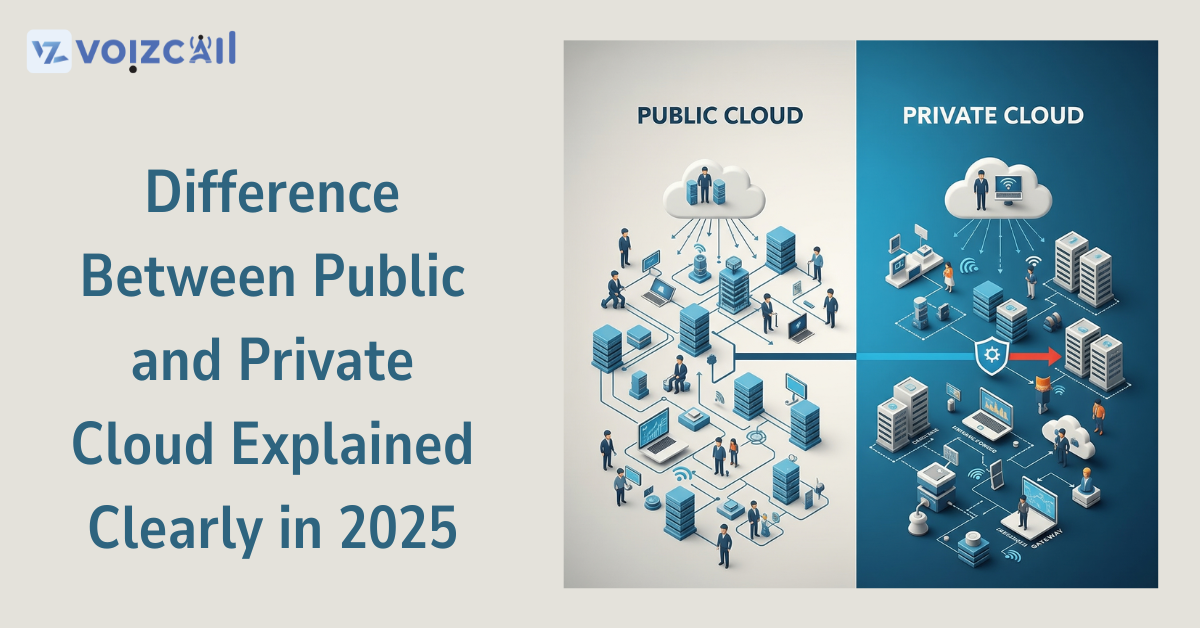


15/Jul/2025
Introduction: Cloud Confusion Ends Here!
Cloud computing is now the backbone of online businesses in 2025. If you're streaming videos, operating a mobile application, or hosting your photos online — you're consuming the cloud. But one question still bewilders many:
What's the difference between public and private cloud?
If you're a business owner, software developer, or technology enthusiast, knowing this distinction is important. In this blog, we will simplify it, without using any tech lingo, and guide you through how to choose the best cloud solution for you.
Blog Structure:
1. What Is Cloud Computing?
2. Public Cloud: What It Means
3. Private Cloud: What It Means
4. Key Differences Between Public and Private Cloud
5. Pros and Cons of Each Model
6. Which One Should You Choose in 2025?
7. Final Thoughts
Cloud computing is a method of storing, handling, and accessing data and applications on the web — rather than on your computer's hard drive.
It exists in various "types" or deployment models, with public cloud and private cloud being the most widespread.
What Is a Public Cloud
A public cloud is an over-the-internet offering by a third-party provider such as AWS, Microsoft Azure, or Google Cloud. You're sharing the same cloud infrastructure with other users (similar to how people share room on the servers of Netflix).
Call / Email for Sales Inquiry Today
Important Characteristics:
Managed by a cloud provider
Shared infrastructure
Accessible over the public internet
Pay-as-you-go pricing model
Real-world applications:
Hosting a website on Amazon Web Services
Using Google Drive for file storage
A private cloud is an exclusive environment constructed solely for one business or organization. It can be hosted on-premises or through a third-party provider — but in contrast to the public cloud, the resources aren't pooled.
Key Traits:
Used by a single organization only
Large degree of customization
Greater control over data and security
Can be hosted internally or externally
Real-world examples:
A hospital hosting sensitive patient information on its own servers
Enterprises utilizing VMware-based private cloud for internal applications
Public Cloud vs Private Cloud: Key Differences
Feature Public Cloud Personal Cloud
Ownership Third-party provider Organization itself
Cost Model Pay-per-use High initial, lower long-term
Scalability High (instant resources) Moderate (manual scaling)
Security Very standard security protocols More stringent, customizable security
Accessibility Through internet Controlled network access
Maintenance Managed by provider Managed by internal IT team
Public & Private Cloud Pros and Cons
Public Cloud: Advantages
Cost-effective
Quick deployment and setup
Scalable on demand
No in-house IT required
Public Cloud: Disadvantages
Shared infrastructure can be security risks
Less customization
Recurring usage fees
Private Cloud: Advantages
High level of control over data and security
Tunable to specific business requirements
Better suited for compliance-intensive industries
Private Cloud: Disadvantages
Higher cost of initial setup
Technical expertise required
Scalability limited compared to public cloud
What Should You Choose in 2025?
Your ideal cloud choice is based on your requirements:
Select Public Cloud if:
You're an SME or startup
You desire quick, economical scalability
You don't process highly sensitive data
Select Private Cloud if:
You're in healthcare, finance, or government
You require total control and tighter security
You possess IT resources or stringent compliance requirements
Last Thoughts: Know Your Cloud, Grow Your Business
In 2025, cloud solutions are stronger than ever — and even more complicated. Understanding the difference between public and private cloud enables you to make smart choices that affect performance, price, and data security.
Both cloud models have distinct advantages, and most often, businesses even go for a hybrid cloud strategy — unleashing the strengths of both.
Important Takeaways:
Public cloud is best suited for flexibility and reduced cost.
Private cloud provides better security and control.
Select according to your business size, data sensitivity, and compliance requirements.